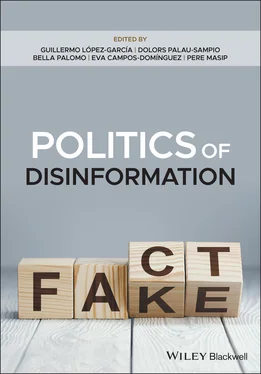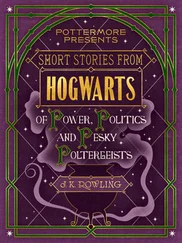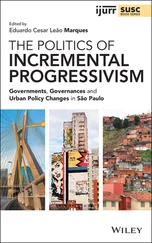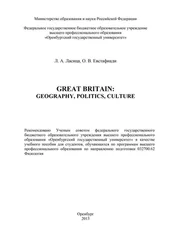Politics of Disinformation
Здесь есть возможность читать онлайн «Politics of Disinformation» — ознакомительный отрывок электронной книги совершенно бесплатно, а после прочтения отрывка купить полную версию. В некоторых случаях можно слушать аудио, скачать через торрент в формате fb2 и присутствует краткое содержание. Жанр: unrecognised, на английском языке. Описание произведения, (предисловие) а так же отзывы посетителей доступны на портале библиотеки ЛибКат.
- Название:Politics of Disinformation
- Автор:
- Жанр:
- Год:неизвестен
- ISBN:нет данных
- Рейтинг книги:5 / 5. Голосов: 1
-
Избранное:Добавить в избранное
- Отзывы:
-
Ваша оценка:
- 100
- 1
- 2
- 3
- 4
- 5
Politics of Disinformation: краткое содержание, описание и аннотация
Предлагаем к чтению аннотацию, описание, краткое содержание или предисловие (зависит от того, что написал сам автор книги «Politics of Disinformation»). Если вы не нашли необходимую информацию о книге — напишите в комментариях, мы постараемся отыскать её.
Discover a comprehensive exploration of the underlying theories of disinformation, and their impact, from leading voices in the field Politics of Disinformation
Politics of Disinformation
Politics of Disinformation — читать онлайн ознакомительный отрывок
Ниже представлен текст книги, разбитый по страницам. Система сохранения места последней прочитанной страницы, позволяет с удобством читать онлайн бесплатно книгу «Politics of Disinformation», без необходимости каждый раз заново искать на чём Вы остановились. Поставьте закладку, и сможете в любой момент перейти на страницу, на которой закончили чтение.
Интервал:
Закладка:
43 Price, V.and Hsu, M.(1992). Public opinion about AIDS policies. The role of misinformation and attitudes toward homosexuals. Public Opinion Quarterly 56 (29–52).
44 Ridder, P.(1980). There are TK fact-checkers in the U.S. Columbia Journalism Review 19 (4): 59–62.
45 Ritonga, R.and Syahputra, I.(2019). Citizen journalism and public participation in the era of new media in Indonesia: from street to tweet. Media and Communication 7 (3): 79–90.
46 Robertson, C.T., Mourão, R., and Thorson, E.(2020). Who uses fact-checking sites? The impact of demographics, political antecedents, and media use on fact-checking site awareness, attitudes, and behavior. The International Journal of Press/Politics 25 (2): 217–237.
47 Rojecki, Aand Meraz, S.(2016). Rumors and factitious informational blends: the role of the web in speculative politics. New Media & Society 18 (1): 25–43.
48 Rossini, P., Stromer, J., Baptista, E., and Oliveira, V.V.(2020). Dysfunctional information sharing on WhatsApp and Facebook: the role of political talk, cross-cutting exposure and social corrections. New Media & Society. doi: 10.1177/1461444820928059.
49 Shin, J.and Thorson, K.(2017). Partisan selective sharing: the biased diffusion of fact-checking messages on social media: sharing fact-checking messages on social media. Journal of Communication 67 (2): 233–255.
50 Silver, A.and Matthews, L.(2017). The use of Facebook for information seeking, decision support, and self-organization following a significant disaster. Information, Communication & Society 20 (11): 1680–1697.
51 Srinivasan, R.(2014). What Tahrir Square has done for social media: a 2012 snapshot in the struggle for political power in Egypt. Information Society 30 (1): 71–80.
52 Stoycheff, E., Nisbet, E., and Epstein, D.(2016). Differential effects of capital-enhancing and recreational Internet use on citizens’ demand for democracy. Communication Research 47 (7): 1034–1055.
53 Tandoc, E.C., Jenkins, J., and Craft, S.(2019). Fake news as a critical incident in journalism. Journalism Practice 13 (6): 673–689.
54 Tandoc Jr., E.C., Lim, Z.W., and Ling, R.(2018). Defining “fake news”. Digital Journalism 6 (2): 137–153.
55 Vosoughi, S., Roy, D., and Aral, S.(2018). The spread of true and false news online. Science 359 (6380): 1146–1151.
56 Vraga, E.K.and Tully, M.(2019). News literacy, social media behaviors, and skepticism toward information on social media. Information, Communication & Society. doi: 10.1080/1369118X.2019.1637445.
57 Waisbord, S.(2018). Truth is what happens to news. Journalism Studies 19 (13): 1866–1878.
58 Wang, A.(2016). “Post-truth” named 2016 word of the year by Oxford Dictionaries. The Washington Post (16 November). https://www.washingtonpost.com/news/the-fix/wp/2016/11/16/post-truth-named-2016-word-of-the-year-by-oxford-dictionaries(accessed 21 February 2021).
59 Wang, M., Rao, M., and Sun, Z.(2020). Typology, etiology, and fact-checking: a pathological study of top fake news in China. Journalism Practice. doi: 10.1080/17512786.2020.1806723.
60 Wang, Y., McKee, M., Torbica, A., and Stuckler, D.(2019). Systematic literature review on the spread of health-related misinformation on social media. Social Science & Medicine 240: 1–12.
61 Wardle, C.(2017). Fake news. It’s complicated. First Draft (16 February). https://medium.com/1st-draft/fake-news-its-complicated-d0f773766c79(accessed 14 February 2021).
62 Wardle, C.(2018). The need for smarter definitions and practical, timely empirical research on information disorder. Digital Journalism 6 (8): 951–963.
63 Wasserman, H.and Madrid-Morales, D.(2019). An exploratory study of “fake news” and media trust in Kenya, Nigeria and South Africa. African Journalism Studies 40 (1): 107–123.
64 Weeks, B.E.(2015). Emotions, partisanship, and misperceptions: how anger and anxiety moderate the effect of partisan bias on susceptibility to political misinformation. Journal of Communication 65 (4): 699–719.
65 Weeks, B.E.and Garrett, R.K.(2014). Electoral consequences of political rumors: motivated reasoning, candidate rumors, and vote choice during the 2008 U.S. Presidential Election. International Journal of Public Opinion Research 26 (4): 401–422.
66 Zimmermann, F.and Kohring, M.(2020). Mistrust, disinforming news, and vote choice: a panel survey on the origins and consequences of believing disinformation in the 2017 German Parliamentary Election. Political Communication 37 (2): 215–237.
2 A Materialist Approach to Fake News
Thales Lelo, Roseli Fígaro
University of São Paulo, , Brazil
Introduction
In recent years, the literature concerned with the spread of so-called fake news has grown because this notion highlights the uncertainty surrounding the interference of disinformation in elections (e.g. the election of Donald Trump in the US in 2016 and the Brexit referendum that same year) (Gelfert 2018). Scholars initially used this concept in the early 2000s to discuss talk shows that mimicked journalistic discourse to satirize socially relevant topics (for instance, The Daily Show from Comedy Central) (Tandoc Jr. et al. 2018). However, there are currently many studies conceptualizing political disinformation in academic research. Given that representative democracy presupposes a well-informed and rational citizenry to participate in decision-making processes, fake news constitutes a political pathology because it would “poison the well” of the deliberative democracy (Levy 2017).
As the current trend in the scholarly literature on fake news has peaked in parallel with the surge of disinformation in the political environment, the primary focus of this field has centered on developing analytical tools to further studies dedicated to textual specificities, digital infrastructure, and the broader effects of fake news on the public sphere.
In this chapter, we systematize the current scholarly trends regarding fake news to propose a materialistic approach to the issue. We aim to elucidate socio-historical aspects that underpin the ongoing surge of online disinformation but often remain unclear in extant literature. Although public debate surrounding fake news emerges along with the crisis in Western democracy and the rise of the social media platforms, they are connected with profound transformations in capital accumulation cycles. In our opinion, these transformations have modified the informational flux and, consequently, have sustained the prevailing disinformation stream.
We develop our argument based on 25 articles about fake news published in academic journals between 2017 and 2019. During this time, scholarly literature related to political disinformation has significantly expanded. To compose this research corpus, we employed two complementary selection criteria. First, from some of the highest-ranked journals on the SCImago Journal Rank indicator (e.g. New Media & Society ; Digital Journalism ; Inquiry; Information , Communication & Society ), we examined articles related to the subject published in the last three years. We then added highly cited articles related to fake news published in journals that were not previously considered in our list to our sample.
In our categorization, the latest studies in this field should be segmented into descriptive and epistemic efforts to look at fake news. Our classification complements those proposed by Tandoc Jr. et al. (2018) and Egelhofer and Lecheler (2019). Following the literature review outlined in the first section, we advance our materialistic approach to fake news. The main aim is to improve on a previously underdeveloped perspective on our current “disinformation order” (Bennett and Livingston 2018), connected with the ongoing discussions regarding platform capitalism (Srnicek 2018; Sadowski 2020). From a Marxist viewpoint recently covered by this line of studies of platforms, it is necessary to stress the historical transformations that have turned low-quality content into a valuable resource to keep the capital accumulation cycle in full swing. Acknowledging that fake news can be found in even the most celebrated era of the printing press (and, for this reason, cannot be viewed as a “new phenomenon”), we emphasize how journalism is, step by step, aligning itself to the financial parameters of platform conglomerates. As a result, nowadays, fake news is just a cheaper way to attract web traffic (and, consequently, to manufacture data) than journalistic information.
Читать дальшеИнтервал:
Закладка:
Похожие книги на «Politics of Disinformation»
Представляем Вашему вниманию похожие книги на «Politics of Disinformation» списком для выбора. Мы отобрали схожую по названию и смыслу литературу в надежде предоставить читателям больше вариантов отыскать новые, интересные, ещё непрочитанные произведения.
Обсуждение, отзывы о книге «Politics of Disinformation» и просто собственные мнения читателей. Оставьте ваши комментарии, напишите, что Вы думаете о произведении, его смысле или главных героях. Укажите что конкретно понравилось, а что нет, и почему Вы так считаете.












